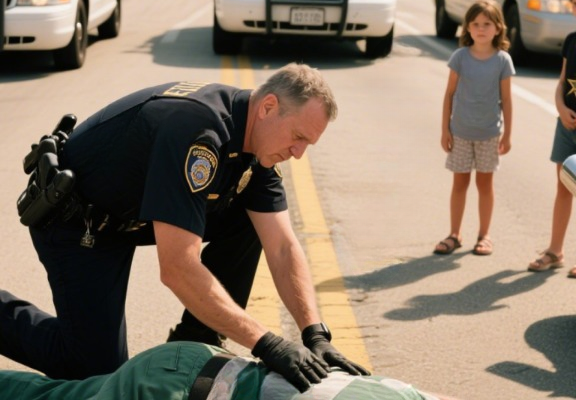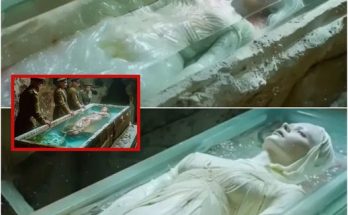My husband Harold is 72 years old, a decorated veteran, and a lifelong motorcyclist. His love for riding isn’t a hobby; it’s part of who he is. That love began when he was sixteen, learning to ride on an old Indian motorcycle under the watchful eye of his father, a Korean War veteran. Over the decades, his bike has been a constant companion — through the chaos of two tours in Vietnam, through our wedding day, and through both the happiest and most devastating moments of our family’s life.
A few weeks ago, that connection was nearly tested in a way we never could have imagined. Harold had been pulled over by the police during what was described as a “routine stop.” Instead of being treated with respect for his years of service, his age, or his lifelong commitment to motorcycling, he was publicly humiliated over a complaint about his motorcycle’s noise. The young officer involved suggested, in no uncertain terms, that Harold was “too old to ride” and hinted that it was time for him to give it up. For a man who had survived war, Agent Orange exposure, cancer, and the loss of our son in Afghanistan, the comment hit harder than any injury ever could.
Harold isn’t the type to make a scene. He’s lived his life with quiet dignity, earning a Bronze Star in Vietnam and raising three children alongside me. But for the first time, he questioned whether he should hang up his helmet. Riding isn’t just a pastime for him; it’s therapy, freedom, and a connection to the memories of his life. That day, I watched the light in his eyes dim — a subtle shift that told me just how deeply this had affected him.
I knew I couldn’t sit by. I began reaching out to neighbors, fellow riders, and veterans’ advocates, quietly gathering support and building a case to show the city council what had happened. What I discovered shocked me: Harold wasn’t the first. Over the past six months, seven other older riders had faced similar harassment after speaking out against a proposed city noise ordinance. Two had already sold their motorcycles, disheartened and humiliated. It was clear that this wasn’t about noise — it was about image. The city wanted to “clean up” certain areas, and bikers, especially older veterans, didn’t fit that picture.
I refused to let this happen to Harold or anyone else. The next city council meeting was our opportunity to act. With the support of Harold’s riding group, our neighbors, and Dr. Patricia Reeves, the head of psychiatric services at the VA hospital, we prepared to make our case. Dr. Reeves, who had firsthand knowledge of the therapeutic benefits of motorcycling for veterans, brought data and statistics, while other riders were ready to share personal stories of how riding had helped them recover from trauma and cope with the challenges of life after service.
The morning of the council meeting, the chamber was packed. Leather jackets, military patches, and determined faces filled the room. When the mayor’s son stood to present his expanded noise ordinance proposal, he faltered at the sight of the crowd. One by one, voices spoke up. I began with Harold’s story. I described his decades of service, his dedication to the community, and the humiliation he had endured. I presented video footage and witness testimony and asked the council a simple question: Is this the message we want to send to veterans, that their service and sacrifices mean nothing if they ride a motorcycle?
Other speakers followed. Veterans shared stories of how riding had saved them from despair and helped them cope with PTSD. Dr. Reeves presented evidence-based research on the mental health benefits of motorcycling. Even the wives of riders spoke about the emotional toll that harassment had taken on their families. Then, an elderly veteran named Walter “Tank” Morrison stood. At 85, Tank had lost both legs below the knee in Korea but continued to ride a specially modified trike. He spoke with conviction about the importance of respect, community, and perseverance, reminding the council that the veteran community had been in the town long before the newcomers and that their contributions deserved recognition, not suppression.
The response was overwhelming. The council withdrew the proposed ordinance, citing the need for further study. The community had spoken, and their voices were impossible to ignore. Even the officer who had initially humiliated Harold reached out afterward to apologize. Harold, true to his character, accepted the apology gracefully and later agreed to help educate new officers on interacting respectfully with the motorcycle community.
In the days that followed, Harold began to regain his confidence. He resumed rides with his veteran group, attended memorial rides, and reconnected with the community he loved. His bike, once a symbol of potential defeat, became a symbol of resilience, freedom, and the unbreakable spirit of a man who had earned every mile.
This experience taught me that resilience isn’t just personal — it’s communal. With support, advocacy, and courage, even the most daunting challenges can be turned into victories. Harold’s story isn’t just about one confrontation with authority; it’s about standing firm in your identity, honoring the sacrifices of veterans, and proving that no one can dictate your path if you refuse to give up.
They tried to make him believe he didn’t belong on the roads anymore. They failed. Because true riders, true veterans, and true fighters never give up. They may bend under pressure and have moments of doubt, but with the right support, they come back stronger than ever. And if anyone tries to stand in their way, they’ll face not just the individual, but the community that refuses to tolerate injustice.
Harold rides because it’s who he is, and no ordinance, no complaint, and no small-minded decision will ever change that. The road belongs to those who’ve earned it through experience, courage, and determination — and Harold earned his place decades ago. Every mile he rides is a testament to his resilience, his dedication, and the life he’s lived fully and fearlessly.
Looking back, the incident could have broken him. Instead, it reminded all of us why we fight for respect, fairness, and dignity. It reminded our community that harassment disguised as law enforcement cannot erase the years of service, sacrifice, and commitment that define a veteran. And it reminded me that support, love, and persistence can transform fear and doubt into triumph.
Today, Harold rides freely, leading veteran rides through town, inspiring younger bikers, and mentoring those who have faced similar challenges. His motorcycle is more than a machine — it is a living chronicle of his life’s journey. They tried to tell him he didn’t belong. But Harold knows who he is. He knows what he’s earned. And he rides because he has every right to do so, and no one can take that away.
Harold’s story is proof that resilience, community, and courage can overcome injustice. That the voices of the people, when united for a cause, can effect change. That respect for veterans isn’t optional — it’s essential. And above all, it’s proof that the road belongs to those who’ve earned it, mile by mile, sacrifice by sacrifice, and memory by memory.



